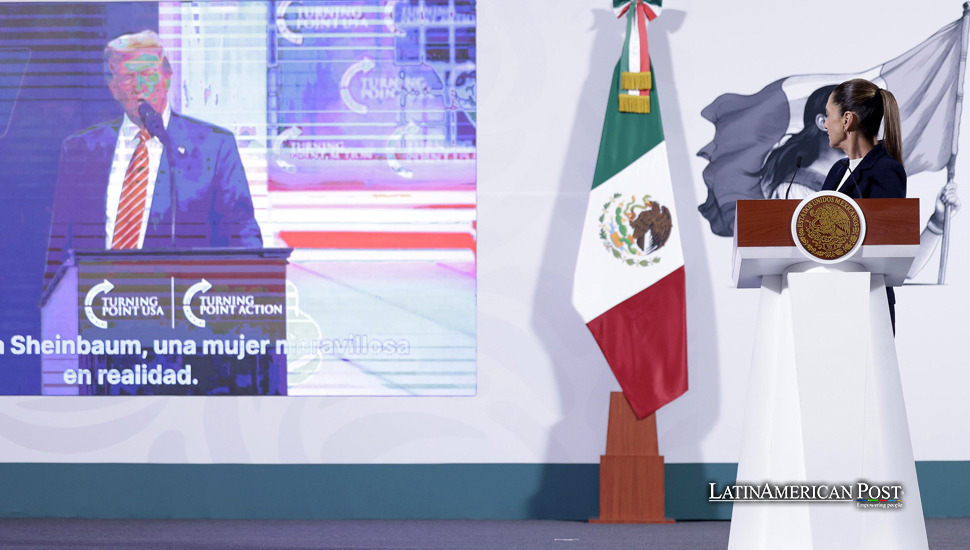Mexico Braces for Tense Relations as Trump Eyes Military Moves

As Donald Trump prepares to start his job, his choice for ambassador to Mexico and suggestions about using the military against drug cartels have caused worry on both sides of the border. For Mexico, these actions point to a possible clash with the U.S., showing strong disagreements on how to tackle the drug trade, migration, and safety issues.
Trump’s Ambitious Agenda Sparks Alarm
Donald Trump’s nomination of Ronald D. Johnson, a former Green Beret and CIA operative, as ambassador to Mexico has sent shockwaves through diplomatic circles. Known for his strict enforcement of Trump-era policies in El Salvador, Johnson’s appointment shows a narrow focus on security and migration rather than encouraging broader cooperation between countries. The appointment comes as Trump has increased his aggressive talk, threatening to label Mexican drug cartels as terrorist groups and even suggesting military actions in Mexico.
According to the L.A. Times, Trump’s campaign plans included using “special forces, cyber warfare, and other secret and open actions to cause maximum harm to cartel leaders.” This approach has unsettled Mexican officials, raising fears of a potential diplomatic crisis.
Mexico’s President Claudia Sheinbaum, who took office in October, has responded cautiously. While she emphasized collaboration on mutual concerns, she made it clear that Mexico would not tolerate violations of its sovereignty. “We will always defend Mexico as a free, sovereign, and independent country,” she posted on X after a tense call with Trump.
A History of Strained Security Cooperation
The idea of U.S. military action in Mexico brings back hard memories of past security efforts that increased violence. In 2006, President Felipe Calderón started a military fight against cartels with support from the U.S., which led to very high murder rates and lasting violence.
Many Mexicans still feel uneasy about U.S. actions in their country’s matters. The arrest of former Mexican Defense Secretary Salvador Cienfuegos in 2020 at Los Angeles International Airport on drug trafficking charges marked a low point in U.S.-Mexico relations. At the time, López Obrador, Mexico’s president, demanded Cienfuegos’ return, accusing the U.S. of “abusive meddling.”
Cienfuegos’ release, coupled with strained ties during López Obrador’s presidency, hampered the DEA’s operations in Mexico. Experts worry that Trump’s militarized approach and Johnson’s background in counter-insurgency could further erode trust between the two nations.
Sheinbaum, a leftist climate scientist, and Mexico’s first female president has signaled a departure from militarized policies. Her stance sets the stage for potential clashes with Trump, who favors a show of force. “Sheinbaum is not a Bukele type,” said Massachusetts Representative Jim McGovern to the L.A. Times, referencing El Salvador’s authoritarian president. “She wants good relations with Mexico … but is not looking to kiss Trump’s ring.”
The Stakes of Militarized Action
Trump’s threats to send soldiers to Mexico have stirred a heated discussion. Supporters say these steps are necessary to dismantle gangs bringing fentanyl and other drugs into the U.S. Critics, however, warn that military action might fail, causing chaos in Mexico and increasing migration problems.
“Mexico can expect enormous pressure,” Maureen Meyer of the Washington Office on Latin America told the L.A. Times, predicting that Trump’s administration will prioritize law enforcement and immigration over human rights and democracy.
Mexicans are divided on the idea of U.S. military involvement. While many are weary of cartel violence, others fear that U.S. troops would undermine their country’s sovereignty. León Krauze, a Mexican commentator, noted that Trump may push for unilateral action to capture cartel leaders, feeding his base with dramatic imagery.
Johnson’s track record in El Salvador adds to the unease. During his tenure, he supported President Nayib Bukele’s controversial anti-gang crackdown, which led to mass detentions, widespread human rights violations, and eroded democracy. Critics worry that Johnson might adopt a similarly heavy-handed approach in Mexico, ignoring systemic reforms in favor of short-term security gains.
Collaboration or Conflict?
As Trump prepares to start his role, the future of U.S.-Mexico relations is unclear. Johnson’s nomination shows Trump’s focus on fighting migration and cartels, yet it raises questions about whether cooperation might grow despite such harsh words.
Mexico’s economic reliance on the U.S. complicates things. Trump’s threat to add 25% tariffs on Mexican goods like avocados, car parts, and tequila could seriously affect Mexico’s economy and U.S. consumers. Economists warn that these actions might create a recession in Mexico, pushing more migrants north.
Despite these looming problems, Mexico’s leaders are really determined to protect their nation’s independence. Sheinbaum has stressed a cooperative yet firm approach, calling for mutual respect and rejecting any form of domination.
The stakes are high, not just for Mexico but for the wider region. Trump’s strict approach might set the tone for U.S. ties with Latin America, as his team aims to connect with right-wing governments in Argentina, Brazil, and other places. Balancing security worries with respect for independence is crucial to keep things steady and build trust.
As Trump and Sheinbaum prepare for their roles, the relationship between the U.S. and Mexico faces an uncertain future. Johnson’s role as ambassador and Trump’s aggressive language suggests a shift toward a militarized style that might strain diplomatic ties.
Yet, there is still hope for working together. Both nations have a shared interest in handling drug trafficking, migration, and economic problems. By promoting dialogue and respecting each other’s independence, they could find solutions that help both sides.
Also Read: Panama’s Sovereignty Must Triumph Over Trump’s Canal Threats
Mexico stands at a crossroads, trying to balance cooperation and resistance. As the world watches, the decisions made in the coming months will shape the path of U.S.-Mexico relations for years to come.





